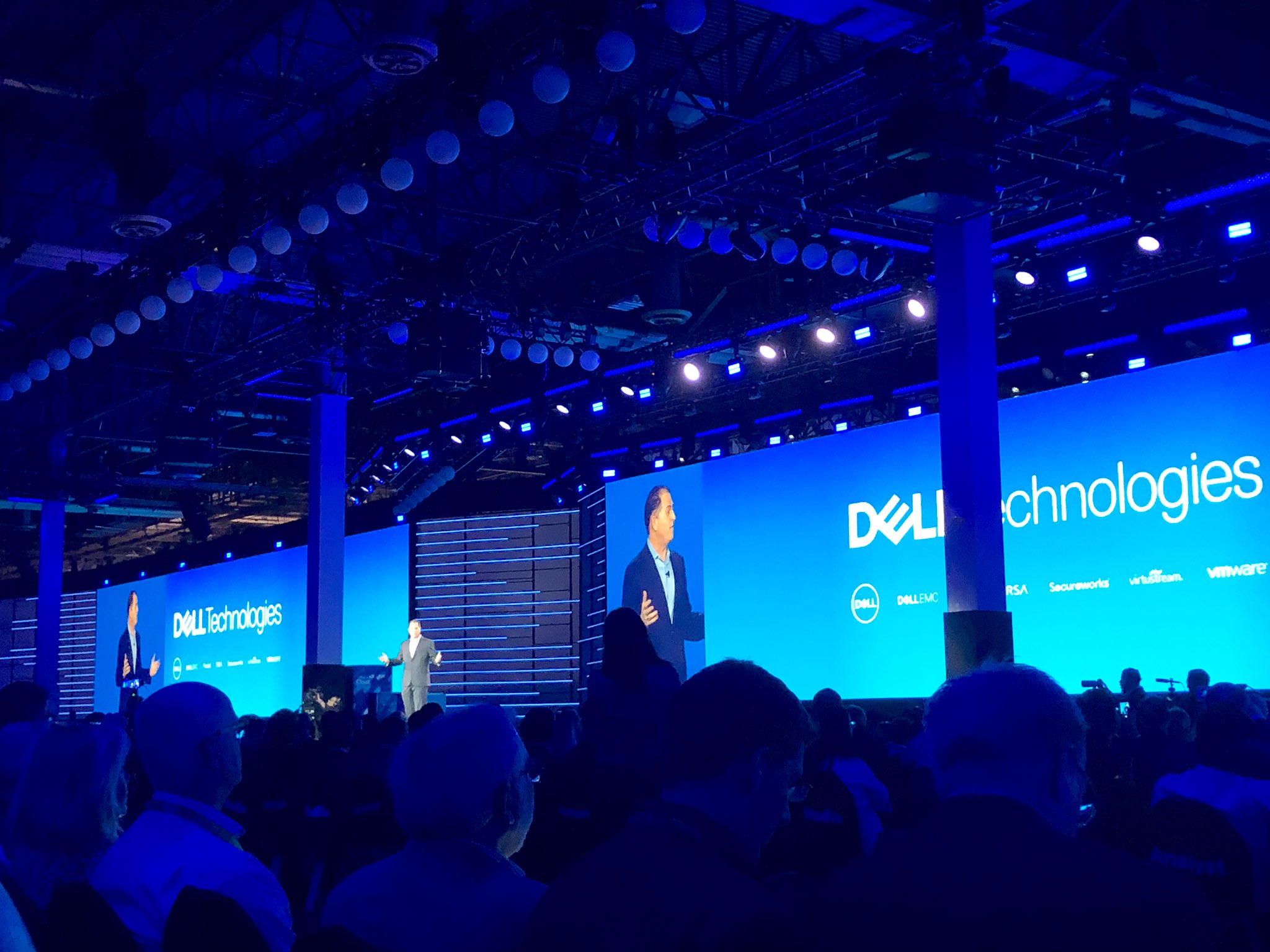 CLOUD
CLOUD
 CLOUD
CLOUD
 CLOUD
CLOUD
Continuing a cavalcade of product rollouts at its Dell Technologies World conference this week in Las Vegas, Dell Technologies Inc. pushed many of the industry’s hottest buttons today with the announcement of new capabilities in cloud, hyperconverged infrastructure, edge computing and artificial intelligence.
The assortment of new products and services runs the gamut from low-end laptops to cloud storage and high-powered servers aimed at AI development. They include a new cloud storage service that’s positioned as an extension of on-premises data center equipment and Dell’s most aggressive drive yet into software-defined wide-area networking.
Following on plans the company revealed yesterday for a data-center-as-a-service offering based upon its VMware Inc. subsidiary, the announcements further Chief Executive Michael Dell’s campaign to integrate acquired technologies more tightly into his overall cloud strategy. “What we’re seeing generally in these latest Dell announcements is a wider optimization of VMware technologies, deeper integration with public cloud platforms and greater simplification of complex processes,” said Charles King, principal analyst at Pund-IT Inc. The conference has been “a clinic in how the depth of the collaboration between Dell and VMware is benefiting customers and resulting in new services, solutions and business engagements.”
“Dell is doubling down on a cloud message going after hybrid and multicloud, which isn’t surprising because most vendors are trying to co-opt those terms,” said Craig Lowery, a research director in the technology and service provider group at Gartner Inc. “It’s good a good position with VMware and the model of being able to run things anywhere in containers is pretty compelling. I think they’re making the right moves.” Containers enable developers to write software that can run on any computing platform by bundling the application and its dependencies in a single unit.
Prior to its late-2016 acquisition of EMC Corp. and its collection of software satellites, Dell didn’t have a strong software story to tell, but with the addition of VMware and Pivotal Software Inc., the company can now make a persuasive argument for its hybrid and multicloud strategy in a market that’s increasingly packed with competitors, Lowery said.
“They’re building something credible, although I don’t think it’s going to be mainstream,” he said. “It’s the right thing to do and should be successful within the ranks of the Dell EMC customer set.”
Highlights of today’s announcements include three new cloud plays.
SD-WAN Edge powered by VMware is a platform that bundles the SD-WAN technology that VMware picked up with its late 2017 acquisition of VeloCloud Networks Inc. into a subscription service that includes Dell EMC hardware and a single support contact.
Dell Consulting Services also is debuting three new services for customers adopting SD-WAN technologies covering advice, design and implementation. This is Dell’s most aggressive move yet in a market that research firm International Data Corp. estimates is growing almost 70% annually. Organizations are flocking to SD-WAN both to reduce the complexity of managing remote offices and to manage the proliferation of internet of things devices requiring unattended operation.
Dell EMC Cloud Storage Services is a new cloud play that provides Dell EMC storage as a public cloud service using high-speed, low-latency connections provided by third-party managed service providers. The service is being positioned as an extension of local data center storage via built-in direct connections to Dell EMC Unity, PowerMax and Isilon storage arrays. VMware customers can combine the service with their VMware Cloud instances running on Amazon Web Services Inc.’s infrastructure for automated disaster-recovery-as-a-service.
The Unity midrange storage system is also getting a refresh with a new unit that features up to twice the speed of the predecessors along with 5:1 data reduction. Unity XT can run in a public cloud and move data to and from the data center via Dell EMC Cloud Storage Services. Dell said the platform provides all the processor power needed to simultaneously run applications, process file and block inline data reduction and deliver operational data services.
Dell also said it will expand its line of hyperconverged appliances with a low-end system called VxFlex that will carry as-yet-unspecified entry-level pricing and give customers who aren’t tied exclusively to VMware additional operating system choices. Dell plans to unify the new server line with and its existing VxRack Flex hyperconverged processors under a single brand with the common VxFlex OS 3.0 operating system. The new hyperconverged model is expected to ship in July.
For users of Dell’s other major hyperconverged infrastructure line — VxRail – early access is now available to Analytical Consulting Engine, a hybrid cloud/on-premises service that combines local data collection and machine learning to enable better availability and performance of VxRail systems.
The platform performs remote measurement and diagnostics and learns about a customer’s installation over time. Early access is available now. Dell didn’t say when the service would be released generally. VxRail’s systems software is also getting a set of new orchestration capabilities for automation, integration, management, analytics and extensions.
In a bid for the growing dollars flowing to AI development, Dell said it will deliver a new member of its high-end server line in the second quarter that combines a two-socket, 4U server with support for up to 10 Nvidia Corp. graphics processing units, high-speed input/output ample capacity for storage. The DSS 8440 server is aimed at the growing market for machine learning, which is a subset of AI. IDC estimates that organizations will spend nearly $70 billion annually on AI products and development in 2022.
“Dell is well-positioned to exploit commercial opportunities as AI continues to mature,” said Pund-IT’s King. “What will always be necessary for AI to succeed are powerful hardware components and effective management tools. Dell has those assets in spades.”
THANK YOU